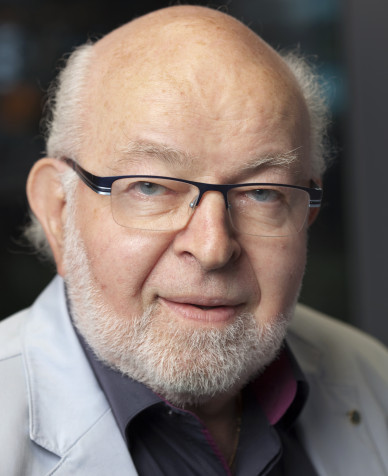Fellows

Carlos SONNENSCHEIN
Physiology et pathobiology, Tufts University, Boston, USA
Fellowship : from October to December 2014
Discipline(s) : Biology
Pays : USA
Research Project: "Building Bridges Between Biology And The Humanities"
Dr. SONNENSCHEIN’s project aims at establishing a productive and meaningful dialog among scientists and specialists in the humanities (artists, writers, lawyers, health professionals and with other professionals represented at IAS-Nantes).
Dr. SONNENSCHEIN’s work has centered in the past and currently on two main biological puzzles, namely, a) why do cells proliferate and move? and b) theories of carcinogenesis, i.e., how are cancers generated?
Because of his evolutionary relevant approaches to these subjects, room is allowed for accommodating complementary alternatives that may help integrate scientific themes with those favored, but not fully explored, by specialists in the humanities. One of these subjects that have occupied Dr. SONNENSCHEIN’s intellectual interest is Racism. The aim of his fellowship at the Institute is therefore to discuss that topic, as well as others, with other Fellows at the Institute, regardless of their professional background. In turn, given his extended background in the biological sciences, he is willing and eager to offer views on topics he feels qualified to opine to these same residents.
Biography
Dr. Carlos SONNENSCHEIN was trained as a Medical Doctor at the School of Medicine, University of Buenos Aires (UBA) in Argentina. He became a pediatric endocrinologist for 5 years. He then turned toward the sciences and trained as a cytogeneticist at the UBA Faculty of Sciences. In 1965, he migrated to USA and settled at the Children’s Hospital in Boston. In 1969, he was appointed as Assistant Professor at Tufts University School of Medicine; in 1980 he became Full Professor there, a position that he occupies today.
His research interests were primed by a three-month period spent in Paris, France, in 1970 at Hôpital Bicêtre (with Prof. Etienne-Emile Baulieu) where he began studying the control of cell proliferation by estrogens. Back at Tufts University, he built an experimental laboratory group dedicated to study the above referred subject. In the late 1980s, in collaboration with Professor Ana Soto, he accidentally discovered that synthetic estrogens were shed from plastic centrifuge tubes. As a result, they established the bases of the field of environmental estrogen disruptors (EED). In 1999, they published their book The Society Of Cells and proposed the tissue organization field theory of carcinogenesis. Dr SONNENSCHEIN is active in this research field.

